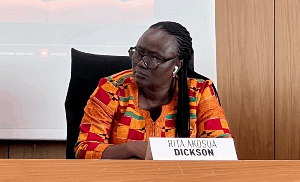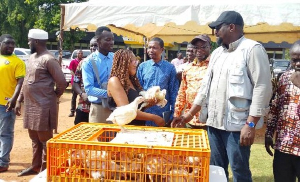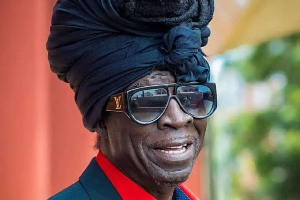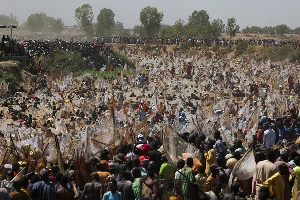by Ekow Nelson
For the very first time I find myself in agreement with Dr. Kwame Okoampa-Ahoofe, Jr., over his views on the P/NDC’s achievements in office (“The New NDC Lexicon: The Truth, the Lies and the Half-Truths”, Ghanaweb feature article) although I am confident that this meeting of minds will not last very long, nor will it extend beyond this issue.
Back in 1999, the veteran Africa editor of Europe’s leading daily financial journal (Michael Holman of the Financial Times) claimed that until Jerry Rawlings’ economic reforms, Ghana had been “crippled by the mismanagement” of Kwame Nkrumah (“Leadership to change, reform to continue”- Financial Times Survey: Ghana, 4th November 1999). Not only did this come as a surprise to many Ghanaians who had experienced life under both governments, but the incontrovertible truth is that far from crippling his country, it is Nkrumah’s enduring economic legacy that has sustained Ghana for much of the period since independence.
Although Nkrumah’s achievements have been repeated over and again by people like me, they are worth restating especially when such crass and uninformed comparisons are made. So here goes: two universities and a university college (now the University of Cape Coast); a hydro-electric facility in Akosombo which has not only provided most of the country’s electric needs since 1966, but for a while, brought in additional revenue through the sale of power to neighbouring countries such as Burkina Faso and the Republic of Togo; the country’s main seaport and the then new industrial township of Tema; the Achiase-Kotoku railway extension that shortened the distance from Takoradi (where most imported goods arrived in the 1950s and early 1960s) to Accra by 160 miles; Okomfo Anokye Hospital; a large stock of secondary schools established under the Ghana Education Trust ; free primary education for all children aged six and above; the only stretch of motorway in the country has for much of the time since independence. The list goes on and on.
Even Holman’s so-called “corrupt and incompetent military regimes” of Generals Acheampong and Akuffo in the 1970s have enduring legacies in the form of the Kpong hyprdo-electric project and the Dansoman Estates in Accra.
What many forget is that although the economic situation in the early 1980s was dire, for much the mid-1980s and 1990s, the P/NDC became one of the few African governments most favoured by major donor nations like the United States and United Kingdom and international financial institutions such as the World Bank and the IMF. In return for accepting prescriptive and often harsh straitjacket economic reforms, the PNDC was rewarded with generous financial support from many donor countries and institutions. An accompanying piece in the same journal (“The journey to democracy”, Financial Times, 4th November 1999,) conceded that Ghana’s so-called remarkable recovery under the PNDC was heavily dependent on international donors.
After all the massive injection of external funds from the international donor community though, what really is the enduring legacy of the P/NDC? OK, a few roads in Ghana were re-surfaced; new flyovers appeared across the capital, Accra - all of these initiated by the way, just as the country was transitioning from a military dictatorship to civilian rule where electoral votes mattered above all. There were claims of a stable macroeconomic environment although as I remember, the cedi was forever depreciating against major foreign currencies and inflation was rampant, peaking at some 40.5 percent when the P/NDC left office in December 2000.
To be fair, the P/NDC government extended electricity across many parts of the country, including remote towns and villages that had been denied their share of the great legacy of the first C.P.P. government. Like the current incompetent N.P.P. administration, however, the P/NDC also purchased a Presidential Jet even while their junior and senior secondary schools (JSS/SS) were failing our children. They gave us the JSS/SS, but did they add to the stock of primary or secondary schools? Did they add to the stock of housing, hospitals or clinics? No they didn’t!
After complaining that the retail price of chicken was too high for the average person when he declared his so-called revolution in December 1981, former President Rawlings and the P/NDC presided over the largest widening of the gap between rich and poor the country has ever seen. Former ‘Afro-Moses’ wearing revolutionaries slid into designer Italian shoes to match their Armani, Valentino and Brioni suits while our primary and secondary were all but collapsing. The University system was creaking at the seams and hospitals and health centres were open but only to those who could afford to carry large wads of cash in their handbags and wallets
No, the P/NDC did not offer a better stewardship of the economy. A more accurate assessment is that they squandered the opportunity to make their country a better place when the rest of the international community was on their side. That, unfortunately, is the sad but true legacy of Ghana’s longest serving government since independence. For all hype around economic recovery under the P/NDC, many people in Ghana were worse-off in 2000 than they were in 1966 or even in 1979 and were we not glad to see them booted out?
© Ekow Nelson, London,
Ekow Nelson
Opinions of Saturday, 12 April 2008
Columnist: Nelson, Ekow














